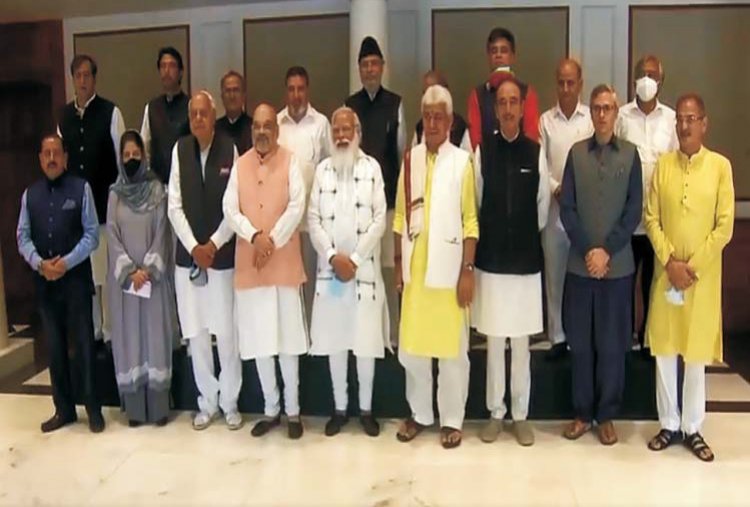Starting Over in Kashmir
Amulya Ganguli

The first step on the road to restore normality in Jammu and Kashmir was taken at the all-party meeting held in the prime minister’s residence in New Delhi on June 24. Considering the number of contentious issues that were on the table, it was surprising that the meeting lasted for more than three hours and was said to have been conducted in a cordial atmosphere.
What this means is that both the sides were keen on putting the past behind them and move forward. But for this intention, it is difficult to image how the participants could have continued their talks for so long even if there was no meeting ground on the restoration of status quo ante by nullifying the abrogation of Article 370, which was the main demand of the parties from Kashmir.
In a way, the government avoided getting into a tangle on the subject by reminding those demanding the restitution of the special status that the matter was sub judice. So everyone will have to wait for the Supreme Court to pronounce its verdict on the scrapping of Articles 370 and 35A in parliament on August 5, 2019.
Arguably, by passing the buck to the judiciary, the government has avoided saying bluntly that the two Articles cannot be restored at present, thereby shying away from emphasizing the hardline position favoured by the hawks in the Hindutva brotherhood.
Apart from the issue of the Union territory’s constitutional status, the other questions discussed by the meeting were less bothersome. These included the ongoing delimitation exercise and the holding of elections for the legislative assembly and parliament.
Although the so-called Gupkar alliance of the Kashmiri parties were critical of the delimitation process which, they suspected, was aimed at tweaking the Union territory’s demographic profile in a way so that its position as a Muslim-majority area will be negated, the alliance has decided to go along with the exercise even if it wanted to know why only Jammu and Kashmir has been singled out for it.
It is also now obvious that once the delimitation process is over, the road to holding the elections will be clear. For the Narendra Modi government, the outcome of these elections will be of crucial importance for, if the pro-Article 370 parties like the National Conference and the People’s Democratic Party (PDP) gain ground, it will mean that the government’s move of August 5, 2019, did not have any popular support in the Muslim-dominated Kashmir valley even if it was largely welcomed in Hindu-majority Jammu and in the rest of the country. The government will hope, therefore, that the two parties do not fare too well.
The third troublesome issue of the release of the opponents of the government’s 2019 move who are still in jail has also been resolved with the home minister promising to set them free soon. It is known, of course, that the topmost leaders of the Gupkar alliance like former chief ministers Farooq and Omar Abdullah and the PDP’s Mehbooba Mufti had spent more than a year in jail after the abrogation of Article 370.
What has prompted the government to try and defuse the situation in Kashmir nearly two years after it put nearly all the important leaders as well as the vocal activists behind bars, station half a million troops and cut off the internet ? One possible explanation is that it was becoming increasingly difficult for it to persist with the absence of full civil liberties in Kashmir without earning international opprobrium.
With Democrats in power in Washington, the government can no longer expect the kind of quiet support it received from the Donald Trump dispensation on the delay in the restoration of all the democratic processes. Nearer home, the American withdrawal from Afghanistan and the likelihood of the Taliban taking over the country mean that India will have to be wary of keeping a section of its own Muslims on edge lest the Afghan extremists take advantage of the disturbed conditions in Kashmir as Pakistan has long been doing. A settlement in Kashmir is the only way out.
If the deletion of Article 370 was in keeping with the Hindutva group’s longstanding ideological agenda, a step back in order to accommodate the critics of the peremptory order is a concession to its possible unsettling international repercussions. When the BJP and its ideological mentor, the RSS, formulated their pro-Hindu programme, they were not in power and were concerned only with its domestic implications.
Now, they may have realized that policies which have an impact on communities other than Hindus cannot be framed without taking into consideration how the rest of the world regard the treatment of minorities. The world is a much smaller place today with the internet and the ubiquitous news channels are ever ready to check whether any injustice is being perpetrated anywhere.
Kashmir’s location at the trijunction of Pakistan, Afghanistan and China makes it a focal point of considerable interest not only because of its geostrategic importance, but also because of the demographic factor since the Muslims of the neighbouring countries cannot be indifferent to the condition of their Kashmiri brethren.
Indian democracy has a special role to play in this context, for it has to demonstrate how the people of different faiths can advance together towards a common destiny in an open society. India is vastly different in this respect from a semi-theocratic Pakistan, a feudal Afghanistan and a communist China.
New Delhi’s initiative, therefore, to bring Kashmir in line with the rest of the country hasn’t come a moment too soon. As the prime minister has said, it is time to reduce “dil ki duri” or the distance between the hearts of the people. In all possibility, this goal will be reached.
















